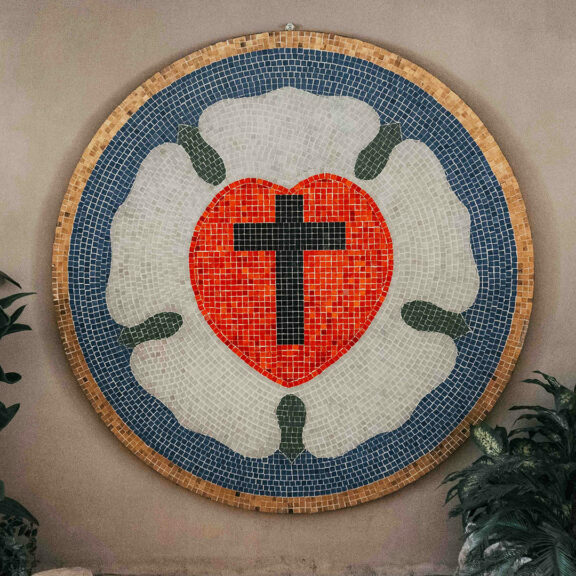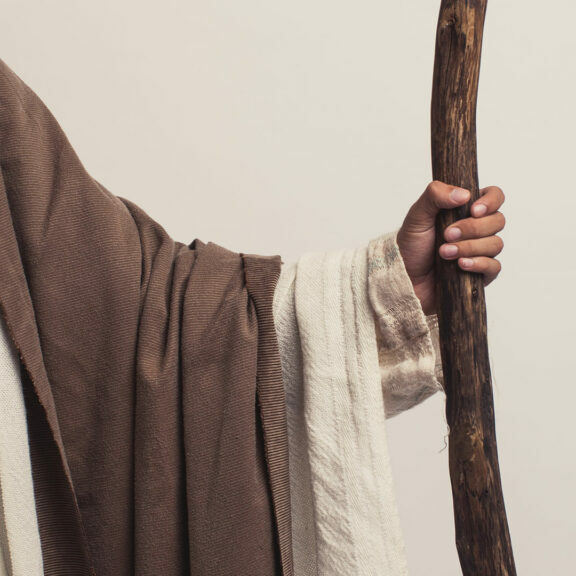January 19, 2025
Pastor Gunnar Ledermann
John 2:1-11
John 2:1-11
1 On the third day a wedding took place at Cana in Galilee. Jesus’ mother was there, 2 and Jesus and his disciples had also been invited to the wedding. 3 When the wine was gone, Jesus’ mother said to him, “They have no more wine.”
4 “Woman, why do you involve me?” Jesus replied. “My hour has not yet come.”
5 His mother said to the servants, “Do whatever he tells you.”
6 Nearby stood six stone water jars, the kind used by the Jews for ceremonial washing, each holding from twenty to thirty gallons.
7 Jesus said to the servants, “Fill the jars with water”; so they filled them to the brim.
8 Then he told them, “Now draw some out and take it to the master of the banquet.”
They did so, 9 and the master of the banquet tasted the water that had been turned into wine. He did not realize where it had come from, though the servants who had drawn the water knew. Then he called the bridegroom aside 10 and said, “Everyone brings out the choice wine first and then the cheaper wine after the guests have had too much to drink; but you have saved the best till now.”
11 What Jesus did here in Cana of Galilee was the first of the signs through which he revealed his glory; and his disciples believed in him.
When your kids or spouse tell you that there is nothing left in the house to eat, it implies something. Typically, with these words, there is the implication for you to do something about the next meal, whether it is breakfast, lunch or dinner. This implied ask reveals their trust in your ability to prepare something to eat, despite any other frustrations or sarcasm that might come with such a request.
At first glance, preparing a meal when there is no food in the house seems like a much more difficult task than writing a note with a pencil. Putting the random items from your pantry into google hoping for a worthwhile recipe or driving to the store to get more food seem like more work than picking up a pencil to write a wedding invitation or thank you card until you stop to consider all that goes into the making of a pencil. In 1980, Milton Friedman, an American economist and statistician, was asked to put together a series of televised lectures. One episode focused on how many people were involved in the making of a pencil. He talked about the wood, which had to be milled and cut down with a chainsaw. And that chainsaw was made from steel, which required iron. And the iron required mining iron ore. Plus, the rubber eraser from a plant that originated in South American that was exported to Malaysia where lots of rubber comes from today. And the paint pigments that had to be sourced, mixed and manufactured. Then also the compressed graphite that must be mined and processed. Also, the bronze fitting that secures the eraser to the wooden pencil. Finally, the glue that holds it all together. Friedman’s point with the pencil was about the economy, and how people who do not know one another, speak different languages and might hate one another if they met are all coordinated in the making of a pencil. For us, this is a reminder that we might see a small need like a pencil to write a note, but behind the scenes far more is taking place than we realize.
At first glance, it would seem like standard procedure to get more wine for a wedding celebration when it had run out. In our Gospel reading from John 2, we hear the account of Jesus attending a wedding in Cana in Galilee. This happened early in Jesus’ ministry so only six of his disciples were with him, Andrew, Peter, James, John, Philip and Nathanael. Jesus’ mother Mary also attended the wedding and went to Jesus when the host ran out of wine. The Jewish weddings at that time lasted a week or more so lots of provisions were needed. Jesus’ response is recorded in John 2,
4 “Woman, why do you involve me?” Jesus replied. “My hour has not yet come.”
Jesus addressed Mary respectfully, but not as his mother. Her request dealt with his power as the Son of God, so he addressed her from that relationship. Mary’s concern for the newlyweds was not wrong or sinful but showed kindness and the desire to save them from embarrassment. More wine might have been accessible in a standard worldly way like purchasing it, but her request of Jesus sought a supernatural response making it anything but standard.
As clearly as Jesus heard Mary, God listens to us. As we go through each day, God listens to us. We may not always offer a formal or direct prayer to him. There are times when we are faced with situations, and we are problem solving without directly asking for God’s help. We have plans and solutions that we chase after. We all have concern, even worry and anxiety over situations in our lives and over those around us. God sees all our thoughts and feelings as clearly as Jesus saw his mother, Mary. It is good for us to remember and remind one another how completely God listens and responds to us. At the same time, we need to remember that God’s standard operating procedure is based on his insight into everyone and everything past, present and future. In the moment or for a season, we might only be able to see a problem and we might doubt God’s involvement because the issue lingers. God does not want us to be alone. God does not want us hopeless in the face of our problems or other people’s problems. God does not want us to stop involving him in our lives to face our hour of need or judgment alone.
Jesus is always with us in our hour of need. Mary listened to Jesus’ response with a heart of faith. His mother had treasured up the promises and perfect love of her son for 30 years. Now, he was going to show her and a few others signs to confirm himself as the Messiah whose hour would come. Mary’s response is recorded in John 2,
5 His mother said to the servants, “Do whatever he tells you.”
Mary trusted in Jesus and directed the servants to follow his command. Jesus moved forward with his plan to honor his Father in heaven and answer his mother all to the glory to God. We read in John 2,
6 Nearby stood six stone water jars, the kind used by the Jews for ceremonial washing, each holding from twenty to thirty gallons. 7 Jesus said to the servants, “Fill the jars with water”; so they filled them to the brim. 8 Then he told them, “Now draw some out and take it to the master of the banquet.”
Once the master of the banquet tasted the wine, he was amazed and complimented the groom for saving the best wine until later, but the groom had done nothing. Jesus allowed the humble servants to know he was behind the solution to the empty wine glasses, perhaps bringing some of them to believe in him. And we read the effect this had on his disciples in John 2,
11 What Jesus did here in Cana of Galilee was the first of the signs through which he revealed his glory; and his disciples believed in him.
His disciples believe in him, and this confirmed their faith that Jesus was the Messiah, the “Son of God” as Nathanael had said in John 1. At this wedding, Jesus confirmed himself as the bridegroom who fulfilled the prophecy from our Old Testament reading from Isaiah 62,
4 No longer will they call you Deserted, or name your land Desolate. But you will be called Hephzibah, and your land Beulah; for the Lord will take delight in you, and your land will be married. 5 As a young man marries a young woman, so will your Builder marry you; as a bridegroom rejoices over his bride, so will your God rejoice over you.
With this sign in Cana, along with many more epiphanies or revelations to come, and more people involved throughout history than the making of a pencil, the disciples pointed to Jesus as the Savior. We do the same as we point to the testimony of the Scriptures to the hour when Jesus died and was resurrected. Jesus has taken us from deserted and desolate to being his bride in whom he delights, who will live with him rejoicing in heaven.
Involve Jesus in your life. Whether an ongoing spiritual struggle or thanksgiving before a meal, go to God in prayer. Our New Testament reading from Ephesians 3, gives us direction and encouragement in our prayer life,
16 I pray that out of his glorious riches he may strengthen you with power through his Spirit in your inner being, 17 so that Christ may dwell in your hearts through faith.
Paul first speaks of the power of the Holy Spirit working in our hearts so that it is the dwelling of Christ. God’s Word grows our faith. Dedicated time in God’s Word strengthens our faith. Dedicated time with God in his word prepares you to trust in God when troubles come and to take those troubles to him like Mary did. When you are filled with and founded on the love of God, understanding and maturity will grow in your heart and mind as we continue to read in Ephesians 3,
And I pray that you, being rooted and established in love, 18 may have power, together with all the Lord’s holy people, to grasp how wide and long and high and deep is the love of Christ, 19 and to know this love that surpasses knowledge—that you may be filled to the measure of all the fullness of God.
With this full measure of God, our requests, prayers and understanding God’s timing will lead us to give him glory as Paul wrote,
20 Now to him who is able to do immeasurably more than all we ask or imagine, according to his power that is at work within us, 21 to him be glory in the church and in Christ Jesus throughout all generations, for ever and ever! Amen.
Mary asked Jesus to do something standard for a wedding, and he did far more. He provided the best wine, and a sign, an epiphany, to reveal his glory filling those who saw it with faith. All the testimony of what Jesus has done recorded in Scripture strengthens our faith in him as our Savior.
When your kids or spouse tell you that there is nothing left in the house to eat, it implies that you do something. When Mary told Jesus that the wine had run out at the wedding in Cana, she had in mind his ability to help. Jesus had the greater picture in mind regarding the hour of his saving the world from sin. Turning the water into wine served both purposes. Jesus listens to our concerns, and he answers us in ways that fit with his desire to bring us to heaven. We go to God in prayer and trust in him as our Savior because Jesus’ sign in Cana reveals his hour to save us would come. Amen.




